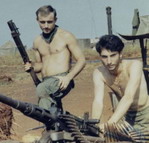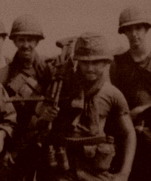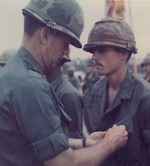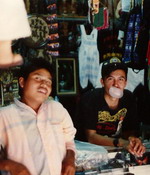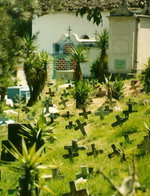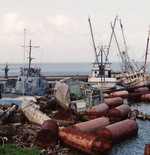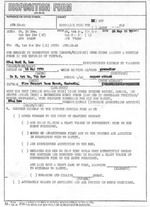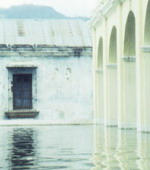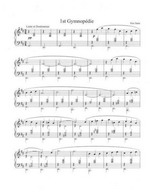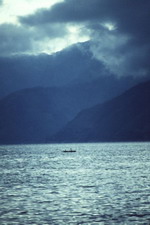At the first knock I startle and rush to the door,
open it and there’s big boned cowboy hat Jim. His big cowboy face
has changed and not changed. The scars have healed up well. He still
wears a droopy mustache. No love beads. No CIB. No Cav patch. But
Jim gives me that dead-eye
-don’t-mean-nothing-kick-ass-and-take-names-later-look. The look
that comes from a million ambush sites, the look ingrained from a
million clover leaf patrols, the look etched into the eyes after a
million steps that might be our last. The look that says
we-kill-them-or-they-kill-us-we-lost-half-the-platoon-ain’t-life-grand-but-I’m-still-hurting,
still-hurting-and-don’t-know-why. The look that says ‘I read you
Loud and Clear,’ or ‘I read you Lazy Crazy,’ or ‘I read you Lucky
Chucky,’ when our sitreps are negative. During the long embrace we
are surrounded by ghosts that choke back our tears and we hold on
until it’s time to let go.
After a time Jim turns away. “This is my wife,” he says.
In blue jeans and red wool sweater Ruth is a slender woman with long
brown hair, large loving eyes and a magnificent smile. When she
steps forward I surrender into the arc of her arms. What is it about
her? What is that? She’s a hundred times more beautiful than the
women of my youth. And I have known a hundred women and known so
little love.
The three of us sit in my tidy living room. Ruth and Jim on the love
seat. Me on the sofa. We make small talk. ‘How was your trip? How
was the traffic? Great weather. Nice neighborhood you got here.’
We drive to town, walk the cobble stone main street, with its quaint
gas lights and antique wood benches, look in the gift filled windows
of rustic shops whose souvenirs are often made by local artists. We
drive to the boulevard, to the large fisherman’s statue overlooking
a splendid sea, read the names of all the men who did not come home.
Under the bright blue sky, our backs to the sparkling waves, we take
photographs.
“Closer,” says Jim.
And Ruth leans close. “Like this?” she asks, curling her arm around
me.
“Yes, sweetie, like that.”
After he takes the photo we are still smiling. There are women in
this world who can make any man feel at ease.
“Where to, next?” asks Jim, putting the camera away.
At the busy ship yard, where bare-chested tattooed men toil to make
things right we wander amongst the rows of deep sea trawlers: an
enormous black spool of fishing net on Take II is being carefully
replaced; a face shielded man with a fiery blowtorch blisters the
bow paint from fifty foot Maryann; fleet Gloucester Girl, with her
forest of top deck radio antennae, sits idle as she hovers and
glides on an ocean of air. Each boat, held aloft on a web of
stilts, appears like a fish out of water.
Thirty minutes later Jim says, “I’m getting hungry, Doc.”
“Me too,” says Ruth.
“I know a good place,” I say.
We drive to the noisy pier side restaurant where the food is good,
the view is better, and the talk is happy. Or so it seems.
Something else is present and somewhere else we know it but now is
not the time to name it.
“On me,” I say, picking up the tab.
The pretty waitress smiles an unstressed smile at her abundant cash
tip.
“Thank you, sir,” she says.
Sir. I have never liked the sound of that word. In fact I soundly
dislike it.
“You’re welcome,” I say.
We leave, walk to the car, drive down winding roads to the deserted
beach, walk the narrow shore line. Sand pipers scurry between
retreating waves. Behind us the grass tipped dunes shelter thin
young men who lie in wait. They’re everywhere and nowhere.
After a mile I say, “ It’s getting cold. Let’s head back to my
place.”
So we do that and once inside Jim hands me an envelope that contains
his war flicks. I go through them like a card shark counting money
after winning the bet. Holding the square portraits in the palm of
my hand, I recall every name, every area of operation, every
casualty and KIA. Jim is quiet so I continue speaking.
I say, “Check this out, man. Check this out.”
I hand him a copy of the orders for Carl Lee’s Bronze Star. Jim’s
eyes zig zag across the photocopied citation. I know every word,
every line, every heart beat by heart. When Jim puts the pages down
we talk about it, how LZ Ranch was over run. Ruth joins in as we
tell it.
“Every time he looks at the war photos you sent him, he cries,” she
says.
Jim turns away. He looks angry. He looks upset.
“Hey, Jimbo. What’s going on?” I ask.
“Nothing, Doc. No problem.” He mimics a smile.
What I say next just spills out.
“Wilson lives in Michigan,” I say, holding up the picture of the
ghost eyed RTO. “He’s married, got a house. Says he can’t sleep
except in the living room. Has to see what’s going on outside. Keeps
a pistol under the pillow. One by the VCR. He’s fucked up.” I look
at Ruth. “Sorry about that,” I say.
Ruth says, “Oh, Jim talks that way sometimes. And he has guns, too.”
Jim stops pacing. “One in the car. Three in the house. Permit to
carry. Got to protect yourself at all times. You know that, Doc.
Have to protect yourself. But that’s got nothing to do with
Vietnam.” He says it once more, nodding his head ‘no’ as if someone
or something else is present. “Not Vietnam.” He starts to pace
again.
I feel bad. Jim’s upset, it’s my fault, and Ruth knows it. I know
she does. What can I do to make things right? I could tell them
about Goreki’s luminous, mournful Symphony Number Three, how all my
sadness and sorrows came bubbling up, flooded the room, spilled and
spilled until sleep washed me away. I want to tell them it was a
turning point but it’s late so I try something else.
“You might like this.” I fiddle with the CD player. “It’s called
Gymnopedie.”
When Jim asks what that means I say I don’t know. I say no one does.
I say all I know is, it’s beautiful and strange. As the soft
dreamlike melody has its calming effect Jim settles himself into
Ruth arms.
* * *
We should get going, honey,” says Ruth. “We have a long drive.”
I turn the player off. Ruth and Jim gather their things. Outside, on
the porch during our long embrace, Jim whispers, “I love you, Doc.”
I say, “I love you, Jimbo.”
Ruth smiles. Then they are gone.
I haven't heard from them since.

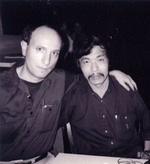
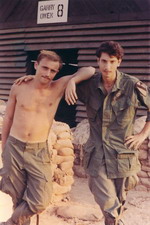
Click Images to Enlarge
All Photos by Marc Levy Unless Noted Otherwise
